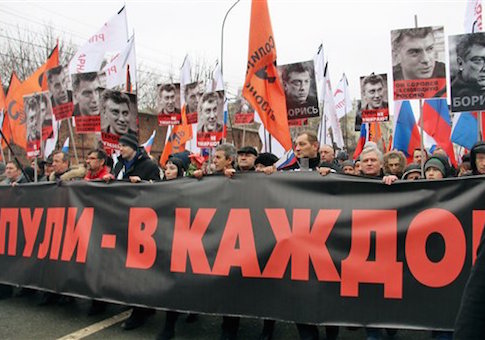Tens of thousands of Russians took to the streets of Moscow and St. Petersburg on Sunday carrying pictures of the murdered politician Boris Nemtsov and placards reading "I am not afraid."
In Moscow, as the crowd approached the Kremlin, it chanted "Russia without Putin," and "Putin, leave!" according to the BBC.
Boris Nemtsov, a former deputy prime minister and one of the most prominent critics of Russian President Vladimir Putin, was killed in a hail of gunfire early on Feb. 28 while walking with a companion near the Kremlin in Moscow. Multiple gunmen sped away in a car.
The 55-year-old Nemtsov long had been an opponent of Putin’s autocratic policies, including the Kremlin’s disregard for the rule of law and the Russian president’s political turn against the West. Before his death Nemtsov was in the process of organizing a major demonstration against Putin’s government, stepping in for the imprisoned Alexander Navalny, another Kremlin critic.
In the 1990s, Nemtsov was viewed as a frontrunner to replace as Russian president the ailing Boris Yeltsin. Putin, the main rival for the job, was then in charge of the presidential administration and ultimately was handpicked for the presidency, in large measure through a backroom deal in which the Yeltsin family would be shielded by Putin from prosecution for what were countless episodes of graft and corruption.
Despite that political setback, Nemtsov chose to remain engaged in Russian politics, supporting groups opposed to Putin.
Nemtsov’s murder is the latest in a series of "misfortunes" that have befallen anti-regime personalities. Navalny has been harassed for years by law enforcement authorities and has been in and out of jail on various charges. Former billionaire Mikhail Khodorkovsky was imprisoned for ten years, and journalist and human rights activist Anna Politkovskaya was assassinated in her apartment building in 2006.
Nemtsov’s death came as he was widely expected to release a report documenting the Russian military’s involvement in the Ukraine crisis. Direct military involvement is something that Putin has denied vehemently to both domestic audiences and foreign counterparts.
Putin has promised Nemtsov’s mother that her son’s killers would be brought to justice. According to a report from Reuters, the Russian government was focusing on multiple theories, including the unlikely probability that Nemtsov, a Jew, was killed by Islamic jihadists, or alternatively that he was murdered by his colleagues in the opposition to besmirch Putin’s reputation.
Nemtsov’s assassination not only silences a popular critic, but almost certainly was intended to send a message of intimidation to other Kremlin opponents.
Putin’s aggression in Ukraine, beginning with the March 2014 annexation of Crimea, has garnered Russia considerable international criticism but limited domestic disapproval. In appealing to Russian nationalism, Putin had succeeded in making Ukraine a political plus, despite the imposition of wide-ranging financial sanctions on the Russian economy.
Nemtsov’s assassination raises a series of questions focusing not only on Putin’s possible culpability but the future of the opposition movement. Despite the well-attended marches on Sunday, Nemtsov’s death leaves the opposition with yet another gap in its leadership.
